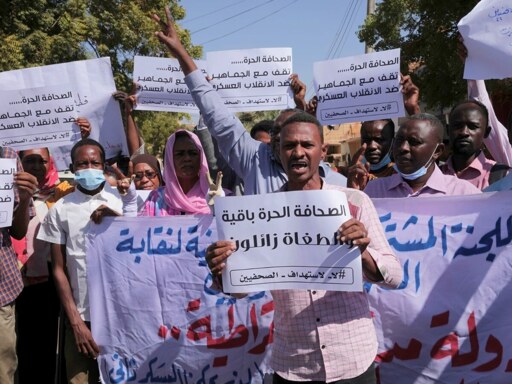The civil war in Sudan has displaced over 13 million people. It’s left more than 30 million in need of aid, of which just under 25 million are undergoing acute hunger.
Within the vast scope of this humanitarian crisis, journalists on the ground in Sudan are being killed or displaced. This, in turn, is limiting the vital flow of information both inside and out of the country.
(N.B.: Both the paramilitary Rapid Support Forces and the journalists’ association Reporters Sans Frontières abbreviate to RSF. As such, this article will use RSF to refer to the paramilitary group, and RWB (Reporters Without Borders) for the journalism campaign group.)
Journalists targeted
On Sunday 5 October, Decolonize Sudan posted on Instagram:
Ever wonder why you don’t see footage coming out of Sudan’s genocide?
Within the past week, the RSF has launched a targeted assault on journalists throughout North Darfur. This pattern of attacks usually happens in anticipation of massacres — silencing the press before mass atrocities are committed.
In Sudan, the RSF isn’t just destroying lives — it’s silencing the truth, because journalism in genocide is survival.
Decolonize Sudan is a women-led campaign group of Sudanese-American organizers dedicated to providing advocacy and anti-imperialist education on Sudan. In their post on the plight of reporting in Sudan, they highlighted the recent cases of three journalists:
Al-Nour Suleiman Al-Nour was killed by RSF fighters on the morning of Sunday 5 October.The RSF kidnapped the director of Central Darfur State Radio, Mustafa Fadl al-Mawla, just days ago.Mummar Ibrahim is currently being starved in the seige on the city of El Fasher.
The UAE-backed RSF is currently imposing a siege on the city of El Fasher in northern Darfur, including artillery shelling, drone strikes and ground incursions. Between 19 and 29 September alone, at least 91 civilians were killed in the attacks. RWB has also recognised the region as one of the worst in the country for media professionals.
From within the city, Mummar Ibrahim recently appeared in a video as part of a press conference, and later posted on X:
My friends, don’t worry about the weight loss or the changes you may notice. I am in El Fasher, but rest assured, I still feel healthy and continue to practice my journalistic work with full energy, thanks to God. The video was recorded this afternoon, Tuesday, August 19, 2025, during my coverage of a press conference and forum on the latest legal and humanitarian developments and the fate of the city. May God lift this siege and heal our beloved country. Just don’t forget to talk about it, because El Fasher is hungry.
Journalism in exile in Sudan
According to RWB, both factions of the civil war have committed crimes against the media, with at least seven journalists killed and another 17 jailed for their reporting. However, despite the immense danger to their own lives, the journalists on the ground in Sudan provide a vital function.
The devastation wrought by the civil war has eliminated much of the media infrastructure. Many of the remaining news outlets have been forced to move across borders into other nearby countries. Their work reporting on the war back in their home relies on contact with the journalists who remain in the warzone.
UNESCO reported in July 2025:
As of May 2025, at least nine journalists have been killed in the exercise of their profession since the war began. Reports indicate that approximately 90% of the country’s media infrastructure has been destroyed, and around 1,000 journalists have been displaced, leaving large parts of the population in an information vacuum without access to lifesaving information. In this context, mis- and disinformation and hate speech are spreading widely and rapidly.
In total, over 400 journalists that we know of have been forced to flee to nearby countries, including 300 to Egypt, 71 to Uganda, 23 to Kenya, 22 to Libya and 15 to Chad. Since 2023, they’ve founded (or continued to operate) at least ten Sudanese exile media outlets.
These include the Sudania 24 and Sudan Bukra TV channels in Cairo, Egypt, along with the Al-Sudani, Saqia Press, Al-Ghad Al-Sudani and Ufuq Jdeed online news sites. Kampala, Uganda plays host to the Salam Media Network, Darfur 24 and Al-Taghyeer. The Aïn investigative website and the Atar news site are based out of Nairobi, Kenya. Finally, Beam Reports is currently located in Kigali, Rwanda.
However, even those who escaped Sudan often find themselves without a safe haven in their new host countries. Martin Roux, head of RWB’s crisis desk, said:
[RWB] hails the courage and remarkable work of Sudan’s exile journalists. But we must not forget the price they pay for continuing to do their job to report the news. After surviving violence and destruction, most now endure very precarious conditions in their host countries, subjected to administrative uncertainties and sometimes harassment. [RWB], which has already helped more than 50 Sudanese exile journalists by means of grants, urges host countries to let them regularise their situation and, instead of sending them back to Sudan, to offer them the stability that is essential for them to keep working. [RWB] also calls on the Office of the United Nations High Commissioner for Refugees (UNHCR) to strengthen protection measures to prevent such expulsions and to prioritise journalists in resettlement programmes. Finally, [RWB] urges donors to provide more support to exile media, which are essential sources of freely-reported and independent information.
Now more than ever, it is vital that the world remains connected to the people of Sudan. The country’s journalists – both within and outside of its borders – maintain that essential lifeline. It is for precisely this reason that their lives are now under threat.
Featured image via the Canary
From Canary via this RSS feed


